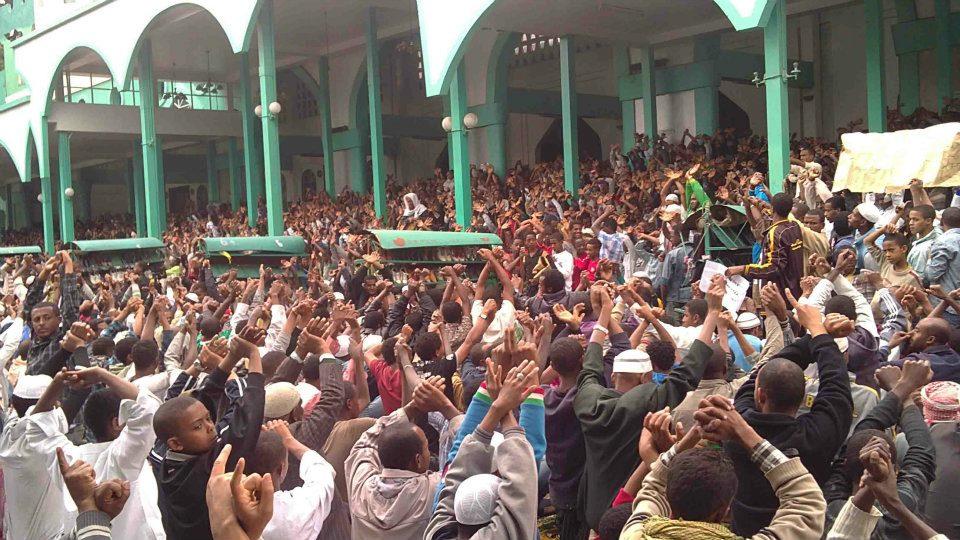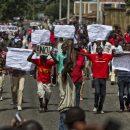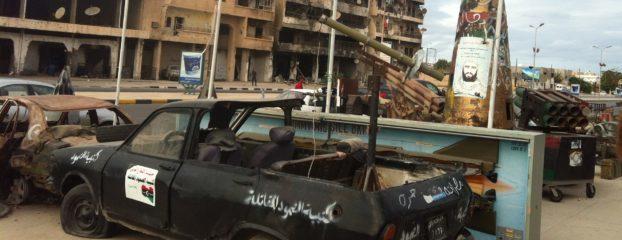Ethiopia: government increasingly intolerant of Islam risks radicalizing muslims – By Alemayehu Fentaw

The Ethiopian constitution provides for freedom of religion and requires the separation of state and religion. However, the Muslim community in Ethiopia has, for more than a year now, been holding protests at mosques around the country against what is perceived as government interference in religious affairs. The protesters are demanding that the current members of the Islamic Affairs Supreme Council (Majlis) be replaced by elected representatives and that elections for Majlis representatives be held in mosques rather than in the Kebeles. Some members of the Muslim community accuse the Ethiopian Government of controlling the Majlis and sponsoring the propagation of Al-Ahbash, a little known sect of Islam.
The Ethiopian Government accuses the protesters of being led by extremists who want to establish an Islamic state in place of the current secular federation. The Ethiopian Government responded against some protests in 2012 with deadly force, most recently in Assassa in April and Gerba in October, resulting in the death of at least seven protesters, a large number of injuries, and the imprisonment of a number of protesters on terrorism charges.
The protests were triggered by the suspension of the Awoliyah Muslim Mission School and the dismissal of 50 Arabic teachers via a letter issued by the Majlis. The Awoliyah Muslim Mission School has been a member since 1993 of the Islamic charitable agency known as International Islamic Relief Organization (IIRO), and has been linked to the Saudi Arabia controlled World Muslim League.
The Ethiopian authorities consider Awoliyah to be a breeding ground for a new generation of radical Muslims, which they refer to as “Salafi-Jihadists” or “Wahabi-Salafists”. However, the Muslim protesters have consistently adhered to nonviolent demonstrations, leaving the Ethiopian Government with little to no evidence of behavior or action that could be described as terrorism. It is clear to date that the Ethiopian Government is manufacturing a security problem where none actually exists. Concerns about “˜terrorism’ in Ethiopia (and the wider world) have degenerated into an irrational suspicion of Muslims, which will continue unabated until Ethiopia and its Western partners reflect more critically on their own perceptions.
It is, to some extent, reasonable to argue that Ethiopia’s leaders are experiencing a growing fear of Islamic terrorism, given the fact that government is currently combating the Al-Qaeda-linked Al-Shabab in Somalia and the Ogaden National Liberation Front (ONLF) in the Somali region of Ethiopia. This is buttressed by a universal consensus among analysts that Somalia and Sudan are exporters of both political Islam and Islamic terrorism. Given that Ethiopia is widely considered as a bulwark against Al Qaeda-linked terrorists in the Horn of Africa, Somalia and, across the Gulf of Aden, in Yeman, one could argue that Ethiopia is not just suffering from siege mentality, but rather that it is a rational fear.
There is, however, some evidence that the Ethiopian Muslim community has been radicalized, although not in the sense that it has a political agenda, but in the sense that it has attained a higher degree of religious consciousness and has become more aware of its particularistic identity. In light of “˜Arab Spring’ events that took place in North Africa and the Middle East, toppling repressive governments, it can be argued that the Ethiopian authorities are haunted by the fear of an “˜Ethiopian Spring’, which has not only contributed to the current crackdown on the media and the political opposition, but also against the Muslim community. Ethiopia has increasingly become intolerant of Islam.
There is little evidence to support the Ethiopian Government’s claim that its own Muslim community poses a legitimate threat to national and regional security. It only seems to be driven by a shrewd strategic calculus. Since Ethiopia is a critical partner in the West’s “˜War on Terror’, the government thinks it helps to foment fear of the rise of radical Islam in Ethiopia that would lead to an improbable takeover of power by political Islam. The current Ethiopian Government seeks to keep Western support and aid flowing into the country through characterizing the Muslim community as linked to Islamic radicals and thus a threat to national security.
To the extent that secularism is a constitutionally enshrined principle of governance, the interference the Ethiopian government is undertaking within religious institutions is unacceptable. Any sponsorship by the government of a religious sect over others or any attempt of privileging one religion over another is illegitimate, be it Al-Ahbash or Wahabi. This is not to divest the government of its legitimate authority to neutralize security threats as they arise. Recognizing the threshold requires not only good public policy and laws, but also responsible enforcement. If the Ethiopian Government supports a religious group such as Al-Ahbash, it must leave the task of propagating it to the faith-based nongovernmental organizations, rather than the Ministry of Federal Affairs. The primary problem is that the Ethiopian Government has already legislated civil society out of existence with its charities legislation, so that the legitimate activities of religious groups are constrained.
The threat claimed by the Ethiopian Government, which as yet is not clear and present, does not emanate from radicalization, but from the embrace of political Islam and its concomitant militancy. The threat emanating from radicalization in my view does not call for direct government intervention. It would have been better addressed by civil society organizations. Unfortunately, in Ethiopia today there is barely any civil society, including religion-based and inter-faith NGOs working in the area of peace and reconciliation as they were legislated out of existence by the government itself.
If the current situation is allowed to continue, the protests will surely grow so much so that they overwhelm the government’s ability to handle the situation. I don’t expect the peaceful Muslim protesters to resort to violent means in the near future. My concern is that the Ethiopian government will eventually resort to more force and repression than is warranted under the circumstances. While it is impossible to predict the consequences, one thing is certain – hatred begets hatred. Some thought the protests would simply go away with the Majlis elections, but now we know that a significant proportion of the Muslim community boycotted the polls that took place on 7 October 2012. The Government claimed the elections were concluded successfully.
Another reason why the Ethiopian Government’s actions are misguided is because Islam has been historically a decentralized religious institution in Ethiopia. With the formal establishment of the Majlis by the Ethiopian Government in 1976, it has enjoyed an official governmental status, with its chairman considered by the government as “representative of the entire Muslim community,” and is accorded the same courtesies as the Patriarch of the Orthodox Church, the Bishop of the Catholic Church and the Head of the Protestant Churches in public ceremonies. Historically, it has always been the responsibility of local mosques to appoint clerics, which makes the Ethiopian Government’s effort to control each and every mosque in the country through the Majlis untenable.
If the Ethiopian Government wants to help resolve this emerging conflict, it should refrain from interference. It should also make a goodwill gesture not only towards meeting the demands of Muslim protesters, but also in promoting a respectful and sustained dialogue among Muslims belonging to different Islamic sects, instead of promoting one sect of Islam to the exclusion of others. A positive first step would be to release the imprisoned elected leaders of the Muslim community and conduct the election of the members of the Majlis at the mosques rather than at the kebeles. Moreover, it must stop sponsoring Ahbashism at the expense of other sects of Islam as long as they respect the constitution and other laws of the land.
Last but not least, the Ethiopian Government should refrain from unnecessary provocations, which have been abundant in government publications and statements by authorities. After all, the Ethiopian Government owes Ethiopian Muslims all due respect and tolerance. Tolerance though is not enough. The problem with applying the concept of tolerance to the case of Ethiopian Muslims is that it neglects the rich history of Islam in Ethiopia. It ignores the fact that Ethiopia’s Muslims were early historical converts in the same way as Ethiopia’s Christians.
Through repressive interference the Ethiopian Government will only sow the seeds of a radicalized political Islam that it seeks to keep at bay.
Alemayehu Fentaw Weldemariam is a Horn of Africa Specialist at the LBJ School of Public Affairs.







[…] case in point: the manifest discontent of the Ethiopian Muslim community that led to a yearlong protestation against “government interference in religious affairsâ€. […]
[…] case in point: the manifest discontent of the Ethiopian Muslim community that led to a yearlong protestation against “government […]
[…] case in point: the manifest discontent of the Ethiopian Muslim community that led to a yearlong protestation against government interference in religious affairs. Among […]
[…] case in point: the manifest discontent of the Ethiopian Muslim community that led to a yearlong protestation against government interference in religious affairs. Among […]
[…] case in point: the manifest discontent of the Ethiopian Muslim community that led to a yearlong protestation against government interference in religious affairs. Among […]
[…] A case in point: the manifest discontent of the Ethiopian Muslim community that led to a yearlong protestation against “government interference in religious affairs.†[…]
[…] case in point: the manifest discontent of the Ethiopian Muslim community that led to a yearlong protestation against “government interference in religious affairsâ€. […]
It’s better if they radicalised , they (Muslims are doing it everywhere and breeding to take overpopulation, see what happened and it’s happening in France UK will be same other countries need to do the same the best is not letting any of them in your country in a first place .In India they pay young boys Muslim to get Indian girl convert get pregnant and leave , they are using so many different tactics.We need to be careful.
And what says in Koran if you not Muslim you are my enemy . It’s a Religion of hate, . Scandinavian countries also suffer but they start to wake up and soon these people will be pushed out. It can be any other way but firm stand against this hatful religion and people who practice it.